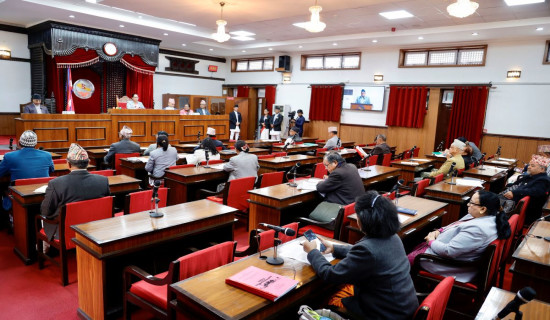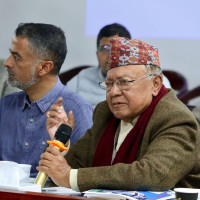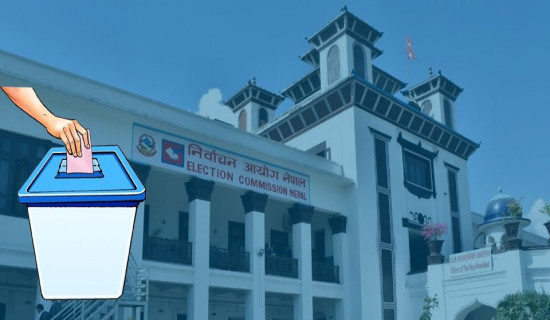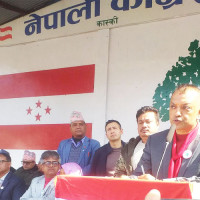- Friday, 6 February 2026
Democracy Day Special
Triumph of Audacity Over Autocracy
The first democratic revolution, spearheaded by Nepali people in 2007 B.S. (1951), was an epoch-making moment in the history of Nepal. It overthrew the 104-year-old feudal autocratic Rana rule and put the new democratic system in place. Internal and external factors were behind the toppling of the ruthless family regime of Ranas, who did not have even an ounce of regard for the ordinary Nepalis deprived of basic rights to speak or organise a political gathering in the public places.
Popularly known as Sat Sal Ko Kranti (the revolution that occurred in 2007 B.S.), the landmark political upheaval had not become successful overnight. Various political parties operating underground inside and outside the country were involved in anti-Rana activities. People wanted to come out of suffocation. But a new era was already dawning on the global stage. The 20th century witnessed some of the biggest events in human history. The two World Wars had shaken the world to the core. The salvoes of democratic revolutions were heard all over the world, rattling the power corridors of Ranas.
Rana rulers had sent thousands of Gorkhalis into the battlefields. They fought on behalf of the British Empire that stood as the bulwark of Rana's dictatorial rule. By forcing Nepalis to get enlisted in the British army, the Rana Oligarchy fulfilled two goals: One is to minimise the risk of threat to their brutal rule. By driving the youth out of the country, the nation would have a fewer number of people inclined to agitate against the Ranas. Second, Ranas also received a hefty amount of money from the British rulers in return for the ‘sale’ of their own citizens. With this quick buck, they fattened their purse and further elevated their status in their aristocratic circle.
Messengers
However, the returnee Gorkha soldiers proved to be the messengers of change. They saw a society structured quite differently on the other side of the world. Following World War II, many countries freed themselves from the clutches of British colonies. They saw independent nations where the people spoke freely and formed associations for the cause of the nation. Gorkha soldiers not only highlighted the importance of free speech and human rights among their own fellow beings but also scarified themselves on the altar of revolution. Their words and experiences spread like sparks in the community, inspiring many people to fight for liberty.
The Rana Oligarchy, established by Jung Bahadur Rana, had maintained sound ties with British rulers but distanced itself from other powers. This isolationist approach aimed at preventing the people from contacting the outer world. Keeping the people always in the dark was not possible as neighbouring nations had passed through sweeping political changes. With India’s independence movement and China’s communist revolution, a new tide is rising in the Himalayan nation. The end of British rule drastically weakened the Rana regime’s capacity to control and suppress the people.
Ten years earlier, four great martyrs—Shukra Raj Shastri, Dharma Bhakta Mathema, Ganga Lal Shrestha, and Dashrath Chanda—laid down their lives for freedom and democracy. They belonged to the Praja Parishad, which was active in rooting out the Rana regime with various underground activities. Anti-Rana sentiments were running high. The armed uprising, led by the Nepali Congress, had a catalytic role in overthrowing the despotic dispensation. It struck a nerve centre of stumbling autocracy. With the collective efforts of people, parties, and kings, the Rana rule was eventually abolished, paving the way for the establishment of multiparty democracy for the first time in the country.
The revolution of 1952 served as the foundational basis of all democratic movements that Nepal saw in different phases of history. It ended the feudal system and ensured the people’s right to choose representatives of their own choice through the periodic elections. Achieving this right is in itself a revolutionary gain for the people who were treated as raitis (subjects). They were treated so badly that they were not allowed to do anything that irked or challenged the status of Rana’s ruling family members.
Democracy is not just a political system. It is also a way of life, as many agree. In democracy, the people’s rights are honoured. Every person wants dignity and respect in his/her life. This dignity lifts people’s emotional and intellectual spirit. Two great German philosophers—Hegel and Marx—have offered two different answers to a fundamental question of life: Why do people struggle in life? According to Hegel, people struggle for dignity. On the other hand, Marx insists that people struggle to fulfil their economic goals. Both answers are not perfect. Neither are they flawed entirely. They are complementary with each other. People struggle to achieve economic ends so that they live a life of dignity. It becomes difficult to lead a dignified life if there is scarcity and penury.
Dignity
And it is democracy that enables people to meet these two conditions—dignity and prosperity. But there should be a true form of democracy that is exercised without the influence of any vested interest. Business or geopolitical interest must not be allowed to impair the sacrosanctity of democracy. If a handful of elites capture power or run the political show behind the façade of democracy, the people’s faith in democracy erodes and the democratic system falters.
Democracy is in itself an ideal term, though its practice is far from being perfect. Democracy is refined through constant practices. Trials and learning take democratic exercise from one stage to another. In this sense, the democracy movement of 1951 marked an epochal event in the life of Nepalis. It was a political renaissance and demonstration of a high level of collective consciousness of Nepalis. It is a victory of audacity over authoritarian penchants. It is also a triumph of knowledge and wisdom over ignorance and fear. This revolution sowed the seeds of democracy. The tree of democracy has become strong and spread widely. This is a reason why no autocrats—hereditary, elected, or selected—dare to trample on it.
(The author is Deputy Executive Editor of this daily.)




-square-thumb.jpg)











